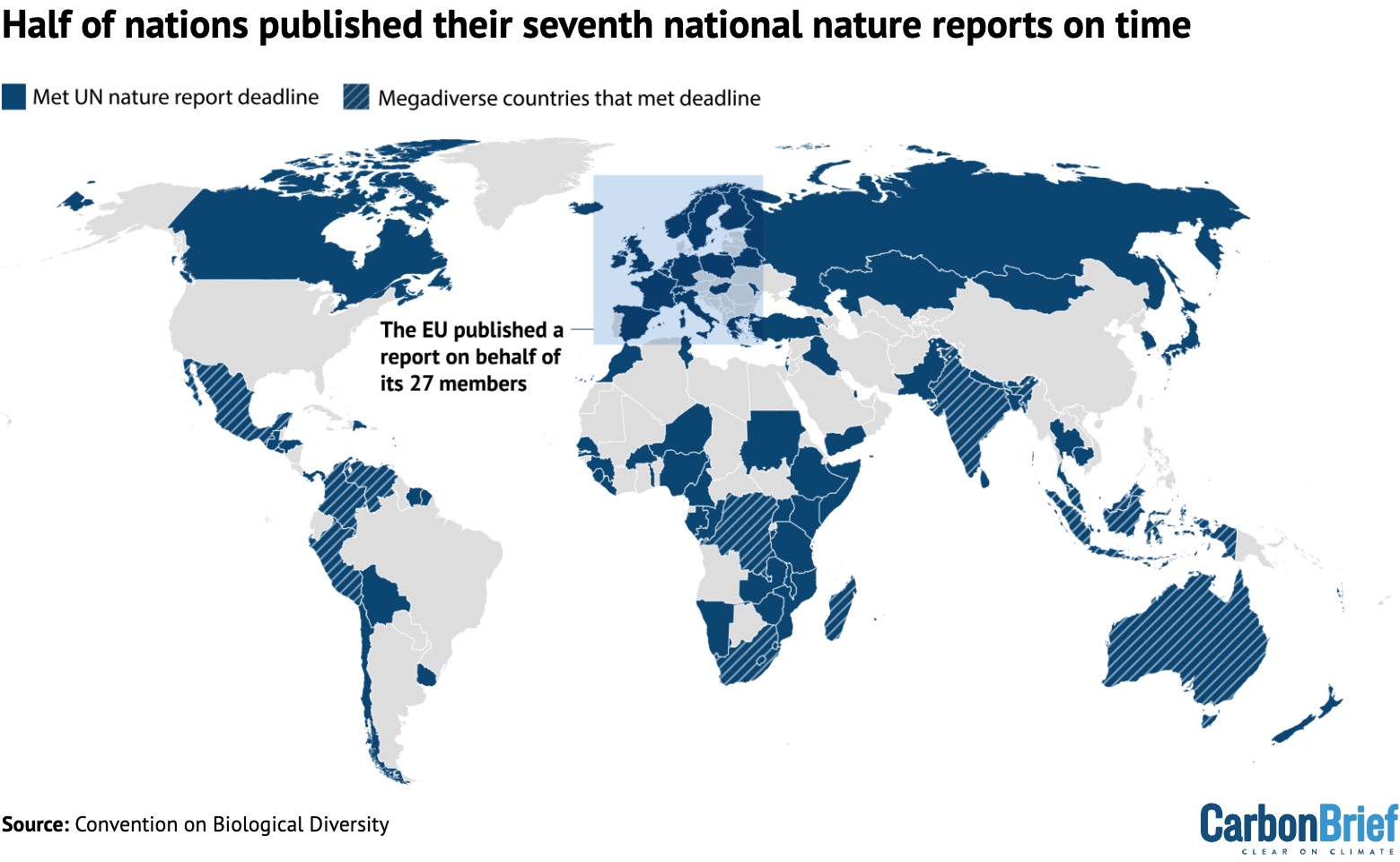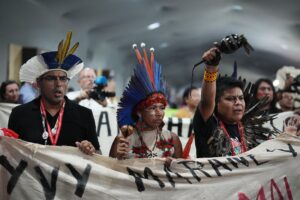The Florida Republican was the home builders’ top recipient of campaign contributions in the Senate last year. His proposal takes up a key industry agenda item.
With war raging in both Israel and Ukraine, this year’s military spending bills are widely viewed as among the most important and contentious items facing Capitol Hill.
Rubio Takes Aim at Biden’s Energy Efficiency Move, Using Military Budget Rider
Climate Change
Analysis: Half of nations meet UN deadline for nature-loss reporting
Half of nations have met a UN deadline to report on how they are tackling nature loss within their borders, Carbon Brief analysis shows.
This includes 11 of the 17 “megadiverse nations”, countries that account for 70% of Earth’s biodiversity.
It also includes all of the G7 nations apart from the US, which is not part of the world’s nature treaty.
All 196 countries that are part of the UN biodiversity treaty were due to submit their seventh “national reports” by 28 February, of which 98 have done so.
Their submissions are supposed to provide key information for an upcoming global report on actions to halt and reverse biodiversity loss by 2030, in addition to a global review of progress due to be conducted by countries at the COP17 nature summit in Armenia in October this year.
At biodiversity talks in Rome in February, UN officials said that national reports submitted late will not be included in the global report due to a lack of time, but could still be considered in the global review.
Tracking nature action
In 2022, nations signed a landmark deal to halt and reverse nature loss by 2030, known as the “Kunming-Montreal Global Biodiversity Framework” (GBF).
In an effort to make sure countries take action at the domestic level, the GBF included an “implementation schedule”, involving the publishing of new national plans in 2024 and new national reports in 2026.
The two sets of documents were to inform both a global report and a global review, to be conducted by countries at COP17 in Armenia later this year. (This schedule mirrors the one set out for tackling climate change under the Paris Agreement.)
The deadline for nations’ seventh national reports, which contain information on their progress towards meeting the 23 targets of the GBF based on a set of key indicators, was 28 February 2026.
According to Carbon Brief’s analysis of the UN Convention on Biological Diversity’s online reporting platform, 98 out of the 196 countries that are part of the nature convention (50%) submitted on time.
The map below shows countries that submitted their seventh national reports by the UN’s deadline.

This includes 11 of the 17 “megadiverse nations” that account for 70% of Earth’s biodiversity.
The megadiverse nations to meet the deadline were India, Venezuela, Indonesia, Madagascar, Peru, Malaysia, South Africa, Colombia, Mexico, the Democratic Republic of the Congo and Australia.
It also includes all of the G7 nations (France, Germany, the UK, Japan, Italy and Canada), excluding the US, which has never ratified the Convention on Biological Diversity.
The UK’s seventh national report shows that it is currently on track to meet just three of the GBF’s 23 targets.
This is according to a LinkedIn post from Dr David Cooper, former executive secretary of the CBD and current chair of the UK’s Joint Nature Conservation Committee, which coordinated the UK’s seventh national report,
The report shows the UK is not on track to meet one of the headline targets of the GBF, which is to protect 30% of land and sea for nature by 2030.
It reports that the proportion of land protected for nature is 7% in England, 18% in Scotland and 9% in Northern Ireland. (The figure is not given for Wales.)
National plans
In addition to the national reports, the upcoming global report and review will draw on countries’ national plans.
Countries were meant to have submitted their new national plans, known as “national biodiversity strategies and action plans” (NBSAPs), by the start of COP16 in October 2024.
A joint investigation by Carbon Brief and the Guardian found that only 15% of member countries met that deadline.
Since then, the percentage of countries that have submitted a new NBSAP has risen to 39%.
According to the GBF and its underlying documents, countries that were “not in a position” to meet the deadline to submit NBSAPs ahead of COP16 were requested to instead submit national targets. These submissions simply list biodiversity targets that countries will aim for, without an accompanying plan for how they will be achieved.
As of 2 March, 78% of nations had submitted national targets.
At biodiversity talks in Rome in February, UN officials said that national reports submitted late will not be included in the global report due to a lack of time, but could still be considered in the global review.
Funding ‘delays’
At the Rome talks, some countries raised that they had faced “difficulties in submitting [their national reports] on time”, according to the Earth Negotiations Bulletin.
Speaking on behalf of “many” countries, Fiji said that there had been “technical and financial constraints faced by parties” in the preparation of their seventh national reports.
In a statement to Carbon Brief, a spokesperson for the Global Environment Facility, the body in charge of providing financial and technical assistance to countries for the preparation of their national reports, said “delays in fund disbursement have occurred in some cases”, adding:
“In 2023, the GEF council approved support for the development of NBSAPs and the seventh national reports for all 139 eligible countries that requested assistance. This includes national grants of up to $450,000 per country and $6m in global technical assistance delivered through the UN Development Programme and UN Environment Programme.
“As of the end of January 2026, all 139 participating countries had benefited from technical assistance and 93% had accessed their national grants, with 11 countries yet to receive their funds. Delays in fund disbursement have occurred in some cases, compounded by procurement challenges and limited availability of technical expertise.”
The spokesperson added that the fund will “continue to engage closely with agencies and countries to support timely completion of NBSAPs and the seventh national reports”.
The post Analysis: Half of nations meet UN deadline for nature-loss reporting appeared first on Carbon Brief.
Analysis: Half of nations meet UN deadline for nature-loss reporting
Climate Change
Dow Asks Texas to Legalize Plastic Pollution from its Seadrift Complex
Facing multiple lawsuits, Dow requests an “unprecedented” permit amendment to authorize its discharge of polyethylene pellets into coastal waters.
Two weeks ago, when Texas sued a massive Dow petrochemical plant over water pollution, state environmental regulators were already considering a novel proposal from the company that would effectively legalize discharges of plastic material from the 4,700–acre complex into waters feeding San Antonio Bay and the Gulf of Mexico.
Dow Asks Texas to Legalize Plastic Pollution from its Seadrift Complex
Climate Change
Why Electricity Bills Are So High—and How the Blowback Could Hit Trump
As Democrats and climate activists seize on energy costs as a political issue, new data shows electricity rates rose 5 percent nationwide in 2025. The figures were much higher in some states.
COLUMBUS, Ohio—Protestors stood in the snow outside the offices of Ohio’s utility regulator in January to say they were fed up with rising electricity rates.
Why Electricity Bills Are So High—and How the Blowback Could Hit Trump
-
Greenhouse Gases7 months ago
Guest post: Why China is still building new coal – and when it might stop
-
Climate Change7 months ago
Guest post: Why China is still building new coal – and when it might stop
-

 Greenhouse Gases2 years ago
Greenhouse Gases2 years ago嘉宾来稿:满足中国增长的用电需求 光伏加储能“比新建煤电更实惠”
-
Climate Change2 years ago
Bill Discounting Climate Change in Florida’s Energy Policy Awaits DeSantis’ Approval
-
Climate Change2 years ago
Spanish-language misinformation on renewable energy spreads online, report shows
-

 Climate Change2 years ago
Climate Change2 years ago嘉宾来稿:满足中国增长的用电需求 光伏加储能“比新建煤电更实惠”
-
Climate Change Videos2 years ago
The toxic gas flares fuelling Nigeria’s climate change – BBC News
-

 Carbon Footprint2 years ago
Carbon Footprint2 years agoUS SEC’s Climate Disclosure Rules Spur Renewed Interest in Carbon Credits








